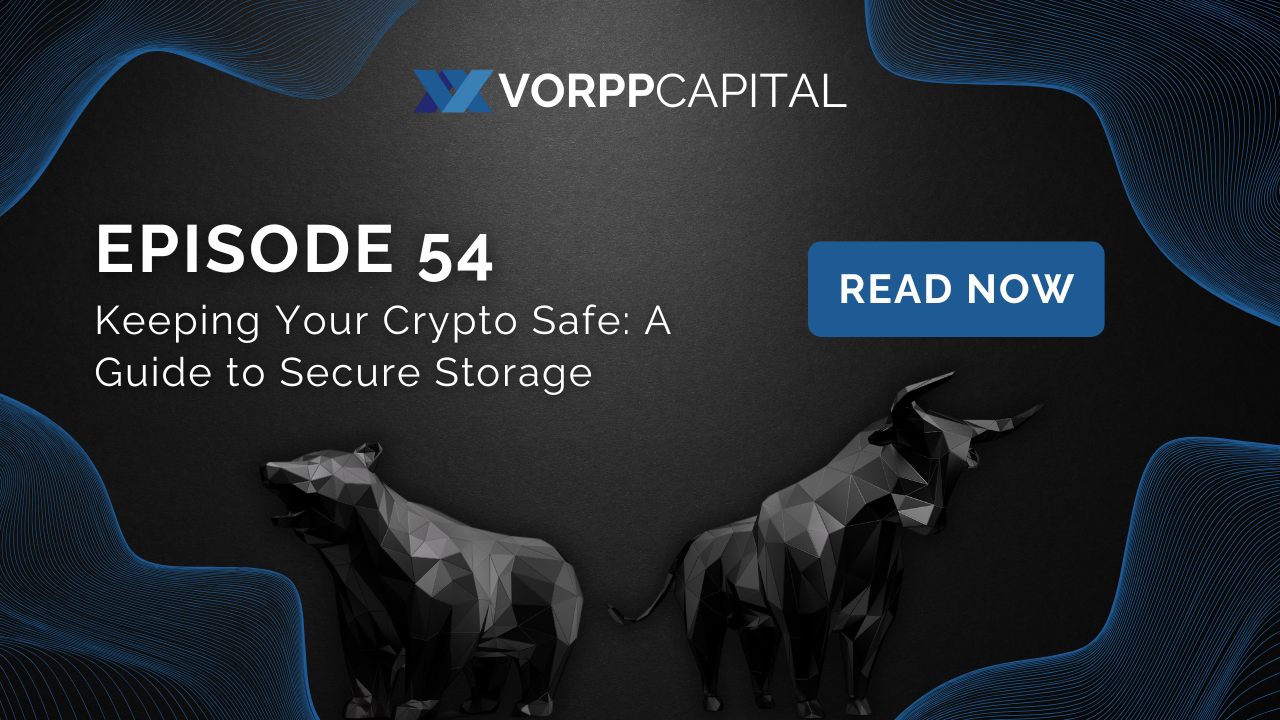Keeping Your Crypto Safe: A Guide to Secure Storage
Feb 22, 2025
The recent $1.5 billion hack on Bybit has once again highlighted a fundamental truth in the world of cryptocurrencies: Not your keys, not your coins. The decentralized nature of crypto was designed to remove reliance on third parties, yet many investors still store their assets on exchanges, exposing themselves to unnecessary risks.
In today's Vorpp Capital Insight, we’ll walk you through the best ways to store your cryptocurrencies securely, why you should avoid keeping assets on exchanges.
Why You Should Never Hold Crypto on an Exchange
Cryptocurrency exchanges like Coinbase, Bybit, FTX, and Kraken operate much like traditional banks, holding customer funds and facilitating trades. However, unlike banks, they do not have the same protections, and they are prime targets for hacks.
Key Risks of Keeping Crypto on Exchanges:
- Hacks & Security Breaches – Exchanges are high-profile targets. If they get hacked, you could lose everything, as seen with Bybit, Mt. Gox, and FTX.
- Regulatory Risks – Governments can freeze exchange-held assets, restricting access to your funds.
- Bankruptcy & Insolvency – If an exchange collapses, your crypto might disappear with it.
- Account Freezes – Exchanges can lock your account without warning, leaving you unable to access your funds.
The entire purpose of Bitcoin and other cryptocurrencies was to remove third-party risk—yet keeping assets on an exchange defeats this idea. The solution? Self-custody.
Digital Wallets: The First Step Toward Security
A digital wallet allows you to control your own private keys, reducing reliance on centralized exchanges.
Types of Digital Wallets
-
Software Wallets (Hot Wallets)
- Examples: MetaMask, Trust Wallet, Exodus
- Hot wallets are connected to the internet, making them more convenient but also more vulnerable to hacks.
- Ideal for small amounts or frequent transactions but not recommended for long-term storage.
-
Cold Wallets (Hardware Wallets)
- Examples: Trezor, Ledger, Keystone
- These are physical devices that store your private keys offline, making them immune to online hacks.
- Ideal for long-term storage of significant crypto holdings.
Cold Storage: The Safest Way to Store Crypto
If you’re serious about protecting your crypto, cold storage is the ultimate solution. Cold wallets store your assets offline, making them nearly impossible to hack.
Why Cold Wallets Are Superior:
✅ Offline Security – No internet connection means no hacking risk.
✅ Private Key Control – Only you have access, reducing third-party risks.
✅ No Exchange Dependence – Your assets remain safe even if exchanges collapse.
Our Recommended Cold Wallet: Trezor
We trust Trezor for one reason: Simplicity and security. While some hardware wallets add complex features that can introduce vulnerabilities, Trezor keeps things straightforward, ensuring that your assets remain safe without unnecessary risk.
How to Securely Store Your Crypto (Step-by-Step Guide)
Step 1: Get a Secure Wallet
- Choose a cold wallet like Trezor for maximum security.
- For short-term use, a software wallet like MetaMask can work, but avoid storing large amounts.
Step 2: Store Your Private Keys Safely
- Never share your private keys with anyone.
- Write down your recovery phrase and store it in a secure location (never online).
- Consider using fireproof and waterproof storage for your recovery phrase.
Step 3: Transfer Crypto Off Exchanges
- Withdraw your assets from exchanges as soon as you buy them.
- Send them to your hardware wallet for long-term storage.
- Always double-check addresses before transferring funds.
Step 4: Use Security Best Practices
- Enable multi-factor authentication (MFA) for all crypto accounts.
- Regularly update your wallet firmware to protect against vulnerabilities.
- Be cautious of phishing scams and fake wallet apps.
Final Thoughts: Take Control of Your Crypto
The Bybit hack is just the latest reminder that trusting exchanges with your assets is a risk not worth taking. If you hold crypto for the long term, take responsibility for your security.
By using a cold wallet like Trezor, following best practices, and never storing assets on exchanges, you can ensure that your crypto remains truly yours—safe, sound, and completely under your control.
Take action today. Secure your crypto before it’s too late.
Access all free resources.
- Vorpp Trading Mastery: Free explainer videos to understand and learn trading basics. From understanding the markets to specific technical analysis, this is your entrance into the World of Trading.
- Access to TradeOS: Get our custom-built trading Journal that helps you structure your strategy and stay consistent.
- Passive Investing Guide: Master the principles of long-term wealth building with our easy-to-follow video course.
- Our eBook Trading – The Biggest Mind Game in the World: Understand the mindset behind success in the markets.
- No credit card. No risk. Just value: Click below and become a free member of Vorpp today.




